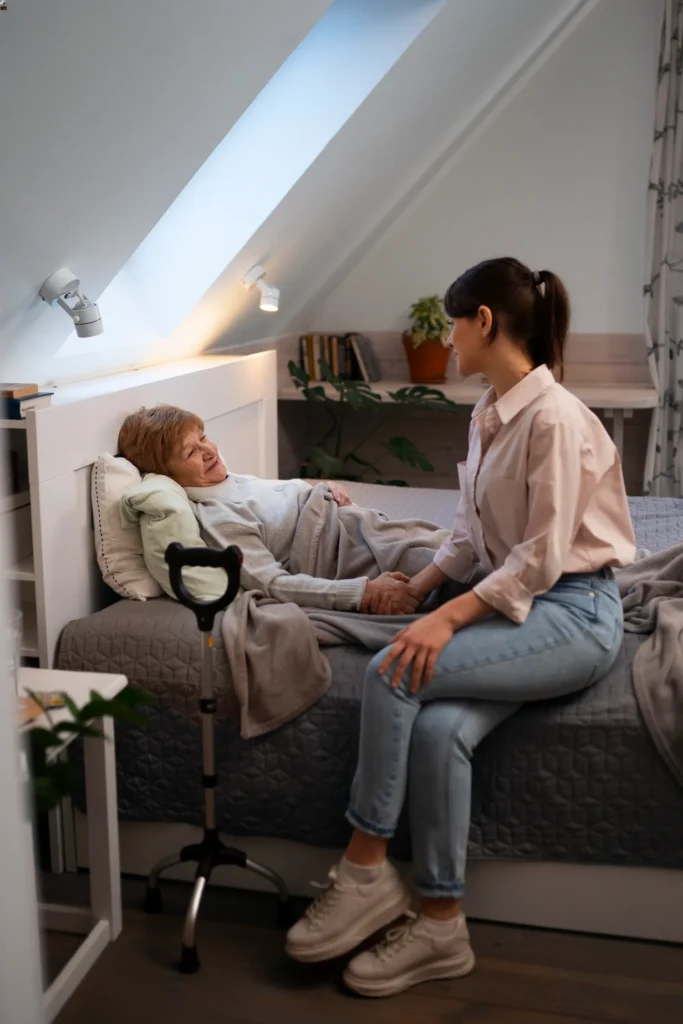How to customize your disability support team
Wiki Article
Why Home Treatment Providers Are Important for Comprehensive Handicap Providers and Assistance
Home care companies play a critical role in providing detailed special needs solutions and support. They assist individuals with disabilities in everyday living tasks, cultivating self-reliance and enhancing top quality of life. By producing customized treatment strategies, these experts address distinct needs, guaranteeing efficient interventions. Nevertheless, their effect extends beyond functional assistance. Recognizing the complete extent of their payments exposes deeper ramifications for neighborhood inclusivity and assistance. What exists under this vital solution?Comprehending the Role of Home Treatment Providers
Lots of may assume that home treatment companies largely help with basic day-to-day jobs, their duty includes a more comprehensive spectrum of support customized to individuals with specials needs. These experts play a fundamental part in boosting the top quality of life for customers by using aid that prolongs past mere housekeeping or individual health. Home treatment providers frequently assist in social interaction, helping to combat sensations of isolation that can go along with handicap. They might additionally aid with drug management, guaranteeing that people stick to their suggested therapies successfully. In addition, home care providers regularly aid in coordinating visits and transport, promoting access to vital medical treatment. By cultivating self-reliance and offering emotional assistance, they equip individuals to engage more completely in their communities. This all natural technique not only addresses physical needs but also nurtures mental and psychological health, highlighting the diverse nature of their substantial role in disability services.Tailored Care Plans for Individual Demands
Customized care plans are necessary for addressing the unique needs of people with handicaps, making sure that each client gets individualized assistance. Home treatment suppliers team up with clients, families, and health care experts to develop these extensive plans. By assessing the certain challenges and preferences of each person, companies can identify needed solutions and treatments that align with their goals.These care strategies take into account different factors, including physical wellness, psychological health, and social communications. They may include support with day-to-day tasks, healing solutions, or specific equipment. The involvement of caretakers that understand the nuances of each client's situation enhances the efficiency of these plans, cultivating a more supportive setting.
Enhancing Self-reliance and Lifestyle
Enhancing self-reliance and quality of life for people with impairments calls for a focus on advertising daily freedom. Personalized treatment solutions can equip clients to make choices that finest match their distinct needs and choices. ndis providers. By promoting this freedom, home treatment providers play a necessary duty in enhancing overall wellness and contentmentEncouraging Daily Freedom
Empowering people with impairments to achieve daily freedom considerably improves their lifestyle. Home care service providers play an important role in this process by encouraging self-sufficiency and promoting freedom. By supporting tasks of daily living, such as personal health, dish prep work, and movement, caretakers aid customers construct self-confidence in their capacities. This support not just boosts functional abilities however additionally advertises analytic and decision-making capacities. By respecting private preferences and selections, home care companies grow a setting where customers really feel valued and equipped. The outcome is a considerable boost in self-confidence and total health, permitting individuals with impairments to browse their day-to-days live with better simplicity and satisfaction. Eventually, advertising day-to-day autonomy is necessary for fostering self-respect and independence.Personalized Care Solutions
Personalized care options are important in satisfying the one-of-a-kind demands of people with impairments, straight impacting their self-reliance and lifestyle. These customized methods consider each person's preferences, abilities, and specific difficulties, making sure that assistance is both effective and appropriate. Home treatment carriers assess individual conditions, developing personalized strategies that attend to physical, emotional, and social demands. By promoting interaction and cooperation, caregivers encourage customers to actively participate in their own treatment, promoting autonomy. This not only boosts their self-esteem but likewise encourages involvement in day-to-day activities. Ultimately, customized treatment options contribute to an extra satisfying and enriched life for individuals with handicaps, enabling them to thrive within their neighborhoods and keep self-respect in their day-to-day experiences.Connecting the Gap In Between Medical and Daily Care
Connecting the gap in between daily and medical treatment is important for individuals with impairments. A collaborated care technique can boost customized day-to-day help, making certain that clients receive both clinical assistance and day-to-day aid tailored to their requirements. This integration ultimately leads to an enhanced lifestyle for those obtaining home care solutions.Coordinated Treatment Approach
A collaborated care method is critical for efficiently incorporating clinical solutions with day-to-day living support for people with disabilities. This approach fosters partnership among healthcare family members, experts, and caregivers, making certain that all elements of an individual's treatment are integrated. By facilitating communication between medical service providers and home treatment personnel, the collaborated method decreases gaps in solution distribution and boosts the general quality of care. This synergy permits timely interventions, lowering healthcare facility readmissions and enhancing health and wellness results. In addition, it empowers people with disabilities by giving a holistic assistance system that deals with both clinical demands and day-to-day living challenges. Ultimately, a collaborated care strategy is essential for promoting independence and enhancing the lifestyle for those with specials needs.Personalized Daily Help
Efficient daily support plays a necessary duty in attaching healthcare with the day-to-day requirements of individuals with impairments. Home care providers customize their solutions to satisfy the special demands of each individual, ensuring that personal treatment, meal prep work, and family tasks are dealt with efficiently (support at home provider). This customized approach not only helps with adherence to suggested medical regimens however likewise encourages people to keep a degree of self-reliance. Caretakers are trained to recognize and address certain challenges that customers encounter, linking the space in between medical appointments and everyday living. By integrating medical expertise with practical support, these carriers boost the total effectiveness of treatment, ensuring that people get all natural assistance that encompasses both their wellness and everyday living needsEnhanced High Quality of Life
While treatment is essential for individuals with impairments, it is the combination of daily living support that genuinely improves their lifestyle. Home treatment suppliers link the gap between clinical interest and daily demands, using tailored aid that promotes independence. By attending to personal treatment, house tasks, and social involvement, these carriers produce a setting helpful to well-being. This alternative strategy not only aids in physical wellness yet likewise cultivates psychological security and social links. When individuals get tailored assistance, they experience raised self-confidence and see enhanced psychological health, causing higher life satisfaction. Inevitably, home treatment solutions empower people with disabilities to lead fulfilling lives, making them a crucial element of complete disability solutions and support.The Importance of Educated Experts

Structure Strong Relationships With Customers and Households
Establishing solid partnerships with customers and their households is necessary for enhancing the general quality of home care solutions. Home care service providers that prioritize communication and count on cultivate an environment where customers really feel risk-free and valued. This connection allows caretakers to better recognize private requirements and preferences, resulting in even more tailored treatment strategies.Moreover, entailing relative in the care procedure assists guarantee that everyone is straightened on goals and expectations. Regular updates and open dialogues create a sense of collaboration, which can reduce issues and construct self-confidence in the treatment being provided.Confident clients and families are most likely to engage actively in the treatment plan, leading to enhanced wellness end results. Additionally, solid connections encourage responses, enabling providers to continuously adjust and fine-tune their services. Eventually, these bonds lay the structure for a supportive, respectful, and effective home treatment experience.Advocating for Rights and Ease Of Access in the Neighborhood
Supporting for the legal rights and access of individuals with disabilities within the community is essential for promoting an inclusive environment. Home treatment providers play a crucial duty in this campaigning for by elevating understanding of the obstacles dealt with by individuals with disabilities. They work together with local companies, federal government firms, and stakeholders to promote policy modifications that improve access to solutions and public spaces.These service providers likewise empower clients by educating them of their civil liberties and offered sources, encouraging self-advocacy. This assistance not only boosts private lives however additionally cultivates a culture of inclusivity in the area. By actively participating in advocacy initiatives, home treatment companies help take down stigma and discrimination, guaranteeing that individuals with specials needs can take part fully in society.Ultimately, the dedication of home care companies to promote for civil liberties and ease of access adds substantially to the growth of an extra supportive and equitable community for all.Regularly Asked Concerns
What Certifications Should I Try to find in a Home Treatment Provider?
When evaluating a home care supplier, one need to consider qualifications such as relevant accreditations, experience in certain treatment requirements, strong communication skills, background checks, and positive recommendations to ensure high quality and safety in caregiving.How Do Home Treatment Providers Differ From Conventional Nursing Treatment?
Home treatment solutions focus on customized support within customers' homes, fostering freedom, while conventional nursing care usually entails medical interventions in clinical setups. This difference stresses customized support versus institutionalized clinical therapy for numerous requirements.What Is the Regular Cost of Home Treatment Providers?

Just How Can I Discover a Reliable Home Treatment Agency?
Finding a trusted home treatment agency entails researching local alternatives, checking out testimonials, ndis providers checking credentials, and seeking suggestions from medical care specialists or buddies. It's important to speak with potential firms to ensure they fulfill details treatment demands.What Insurances Typically Cover Home Care Solutions?
Insurance protection for home treatment services commonly includes Medicare, Medicaid, and personal medical site web insurance strategies. Each policy varies, so people need to consult their insurance policy supplier to recognize details benefits and protection information associated to home treatment services. Furthermore, home treatment service providers regularly help in coordinating appointments and transportation, promoting access to necessary medical treatment. By assisting in communication in between medical service providers and home care personnel, the worked with technique reduces spaces in service shipment and improves the overall high quality of care. Home treatment providers tailor their services to satisfy the unique requirements of each person, ensuring that personal care, meal prep work, and household tasks are dealt with efficiently. Home treatment services focus on individualized help within customers' homes, fostering freedom, while conventional nursing care usually involves medical treatments in scientific settings. The normal cost of home care services differs commonly, depending on aspects such as place, level of care needed, and period of service.Report this wiki page